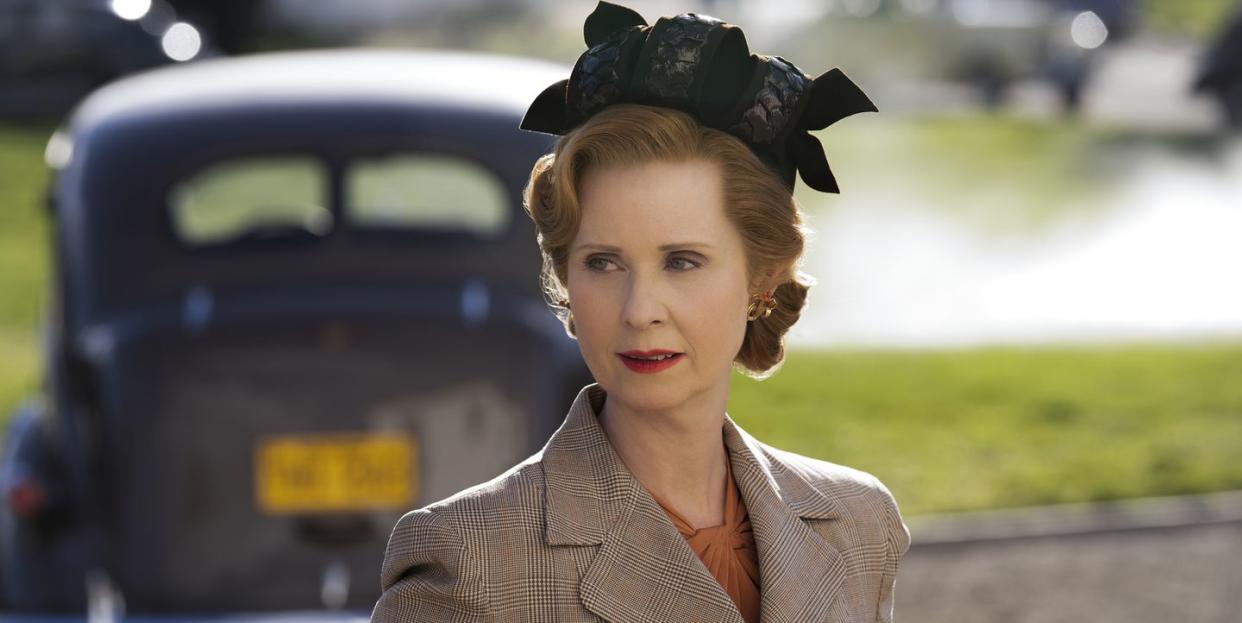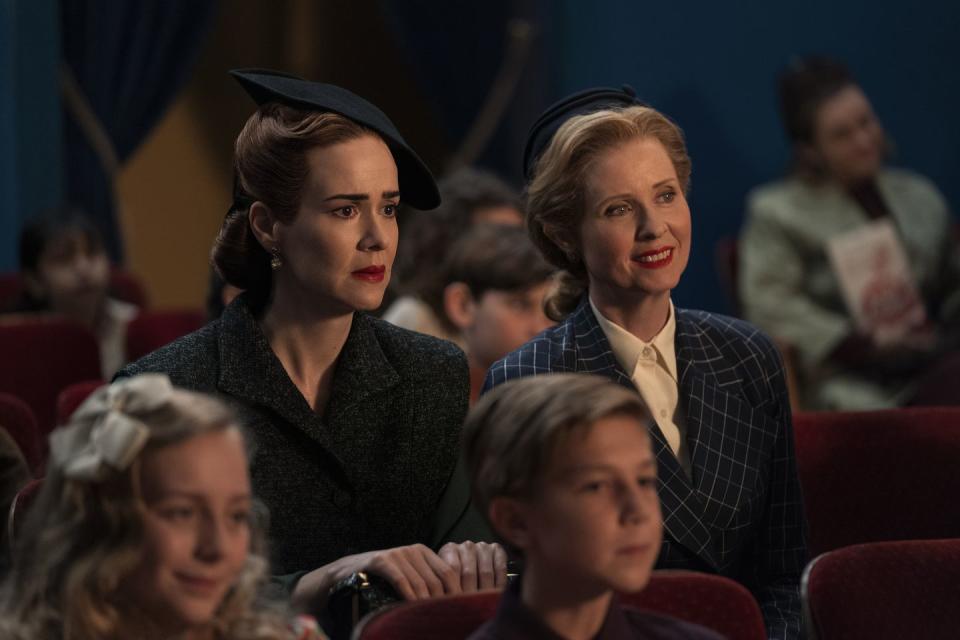Cynthia Nixon Begins a New Chapter in Her 40-Year Career with 'Ratched'

You might think that after years of tirelessly advocating for our democracy, earning Tony and Emmy Awards, and cementing icon status as pragmatic lawyer Miranda Hobbes on Sex and the City, Cynthia Nixon has done it all. But when it came to the role of sensitive yet successful Gwendolyn Briggs, the campaign manager to a two-fisted governor of California (Vincent D’Onofrio) in showrunner Ryan Murphy’s Ratched, the actress was in unfamiliar territory.
“I just thought, ‘I’m amazed that Ryan has thought of me for this, because I don’t usually play the sunny optimist. But I will try,’” Nixon tells BAZAAR.com. It’s true: Miranda is the snarky, type A woman who once said, “I made the cautious decision not to have sex until conditions improve.” First Lady Eleanor Roosevelt, who Nixon portrayed in Warm Springs, was never known to mince her words. And as Becca in Broadway’s Rabbit Hole, the actress went to some of the darkest, most traumatic headspaces of her career.
But Gwendolyn is different in almost every way. In a bar scene in Ratched, she’s introduced as the confident, cigarette-smoking aide to a powerful man in the 1940s. As we get to know her, we recognize her as the influential woman in love with none other than Mildred Ratched (Sarah Paulson), one of the most formidable antagonists in cinematic history. As a prequel to One Flew over the Cuckoo’s Nest, Ratched explores how the titular character became the famed nurse who intimidated R.P. McMurphy (played by Jack Nicholson in the 1975 film) and other patients at a mental hospital.
Initially fraught with resistance from a closeted Mildred, Gwendolyn becomes the affectionate chapter of Mildred’s narrative that history omitted. “Gwendolyn is the only one that really has the power to unsettle Mildred, because Mildred has gained [the] power and confidence she has by steeling herself and suppressing her emotions,” Nixon says.
Ahead, the actress talks to us about Gwendolyn’s “frankness” as a gay woman in many ways far ahead of her time, conquering new challenges 40 years into her career, and seeing Mildred Ratched through new context.
How did you come to be part of Ratched?
I had heard about this project and [that] there were a number of juicy roles that I might be right for. And then I got a call from Ryan Murphy, slightly before Christmas in 2018, offering me the role of Gwendolyn. I think I was Christmas shopping in, like, a Banana Republic or something. We talked about it for quite a while, and then he sent me the scripts, and I talked to Sarah Paulson, who’s a friend, and I said, “This is going to be great.”
At the time, [Murphy] had told me that Amanda Plummer and Harriet [Sansom] Harris, Judy Davis, were in the project. Sharon Stone and Sophie Okonedo were not part of it yet, but I thought, That is some company that I would like to be in.
What drew you to Gwendolyn?
I thought it was such an interesting character, not like the kind of characters I usually play that are kind of darker and more complicated. And she was so purely who she is and so optimistic and determined and, unlike any other character in the show, didn't have parts of her that she was deeply unsettled by or trying to eradicate or forget. And I just thought, “I’m amazed that Ryan has thought of me for this, because I don't usually play the sunny optimist. But I will try.”

It is nice to see a woman so vulnerable and emotionally bare in a powerful position.
I think that there are so many powerful women characters in Ratched. But I think that Gwendolyn is the one with the with the biggest heart and the only one that really has the power to unsettle Mildred, because Mildred has gained [the] power and confidence she has by steeling herself and suppressing her emotions. But Gwendolyn just keeps reaching out and trying to touch the emotional part of her. In some ways, Mildred is so grown up even beyond her years. But when it comes to emotion, she’s really just still a very hurt frightened child.
I think a lot of us struggle with that as adults.
Yeah, I think so too.
What kind of preparation did you do, if any, to get into her mind and better understand the era in which she lived?
Since I played Eleanor Roosevelt about 15, 16 years ago, I’ve been very interested in this historical person named Lorena Hickok, a journalist who was Eleanor Roosevelt’s lover during the time when Franklin was running for the White House the first time and was in the White House for the first time. We tried to make a sequel to Warm Springs, the film in which I played Eleanor Roosevelt, about that relationship.
I found so many parallels between Lorena and Gwendolyn that I went back and reread letters and looked at photographs. Because, similar to Gwendolyn, Lorena was a woman who was living in mostly a man’s world. She was kind of hard drinking. She was very ambitious. She was very successful. She had a string of very passionate love affairs with women, many of which turned out badly and left her brokenhearted, not the least of which was her love affair with Eleanor. I thought, She’s a great prototype not just for her personal journey but also in terms of the way she dressed and the way she seems in her dress—if you’re looking carefully like a gay woman—but also is able to very much pass in her professional life.

Gwendolyn’s personal life sometimes collides with the political world, and she is forced to make a difficult decision. What was important for you to convey as you helped illuminate that?
I guess the odds that Gwendolyn was up against—to be a woman in politics in 1947, who hoped to run for office one day herself. To be a gay woman who was trying to carve out a life in which the distance between what she was presenting to the world and what was true was as close as possible. And the odds are almost insurmountable. Gwendolyn is doing pretty well by the end of Season 1. But I don’t know how long her success story is going to last either personally or professionally.
I agree. I was very struck by how tender Gwendolyn and Mildred’s relationship became, especially since we’d previously known the latter as such a villainous character. What struck you about their relationship when you first read the script?
Gwendolyn’s frankness. I feel like it must have been extremely difficult at that time, if you were a woman interested in another woman, to even broach the topic much less get anywhere. I think that Gwendolyn does her best to be straightforward and honest about what she wants and [how] she feels. She gets rebuffed many times and gets her heart wounded many times. But her sticking by what she knows to be true and she feels in her bones is [what] I really adhered to when I was playing [her].
Because so much of Gwendolyn is folded into Mildred characterization, were you also considering whether their relationship softens Mildred? Did it make you reexamine who Mildred was?
Yes. I think that if the series continues, and we get to … I guess it would be Season 4, we would eventually get the Mildred that we know from One Flew over the Cuckoo’s Nest. And I hope we get to that point, because it seems to me so much of Mildred’s hardness and brutality comes from these long-ago rights she’s trying to wrong and her very perverted sense of what mercy means. But I also think one of the things that is kind of a recurring motif is the ways in which women are compelled to act or feel they have to act in order to attain or hold positions of power.
When Ryan spoke to me initially about the project, he really said, “I want to talk about this moment in American history where people of color and women had been such an integral part of the war effort and so many doors had opened and opportunities had been given that had been previously closed off. And then when victory was achieved, everybody was told, ‘Okay, thanks so much. It’s time to go back to your original positions now.’” And what a kind of devastating, wrenching surprise this was.
For so many women, they had begun to believe that there were careers waiting ahead for them and that their horizons had actually broadened, and this rude awakening told them actually nothing has changed at all except you. You now really know for sure that you are capable of holding these jobs and having these careers that you’re being barred from.
Is what motivates you today as an actress the same as when you first started?
I think it really is. I have to say that, because I started acting when I was, like, 11, 12. For me, the number one goal was always to work with talented people and do interesting roles, ideally roles that were different than [ones] I had tried before. I guess my one difference is, up [until] Ratched, in the 40 years I’ve been acting, I had never agreed to do a TV series in Los Angeles, because I really wanted to be in New York. Now, after I’ve [had] three kids—two of them are grown and one of them is nine (he’s getting there)—it was the first time I ever felt like, “Okay, this seems so exciting. I could actually dip my toe in the water of doing a series in L.A.”
This interview has been edited and condensed for clarity.
You Might Also Like

 Yahoo News
Yahoo News 